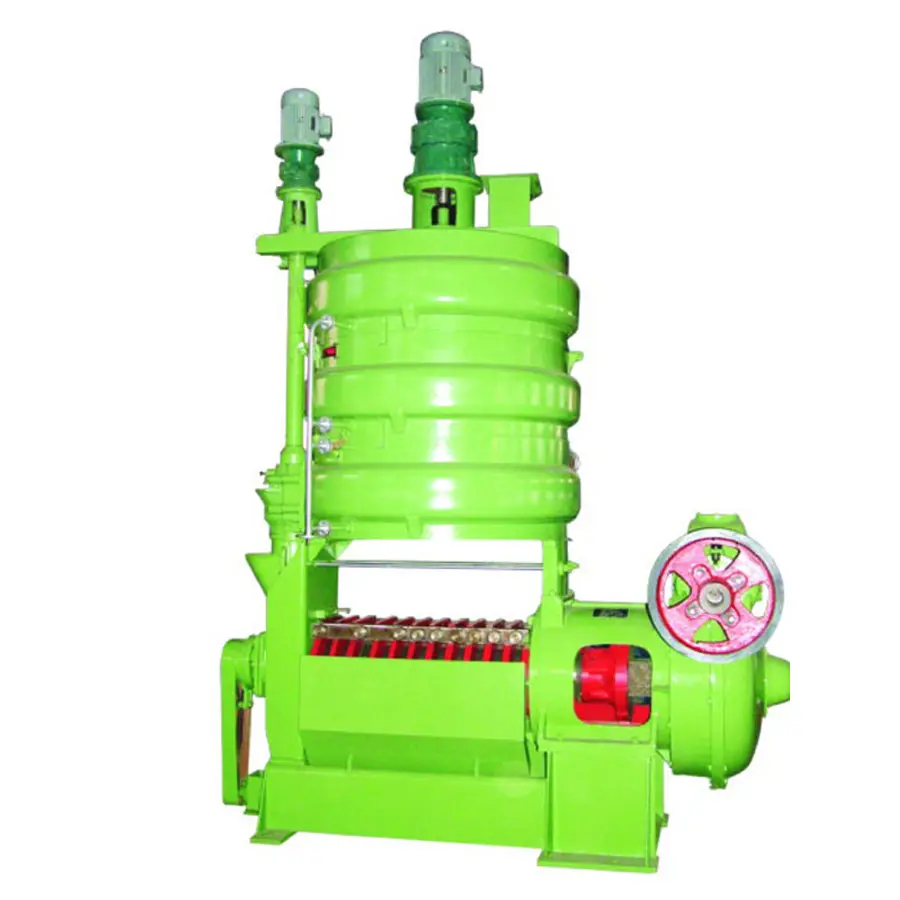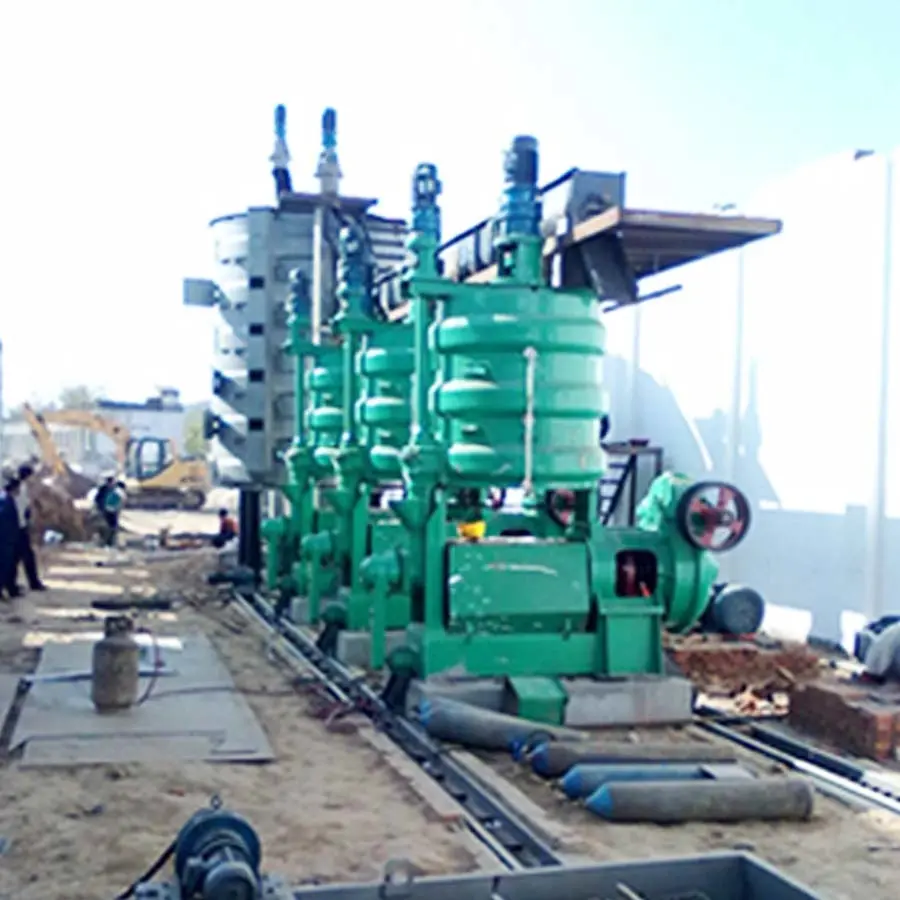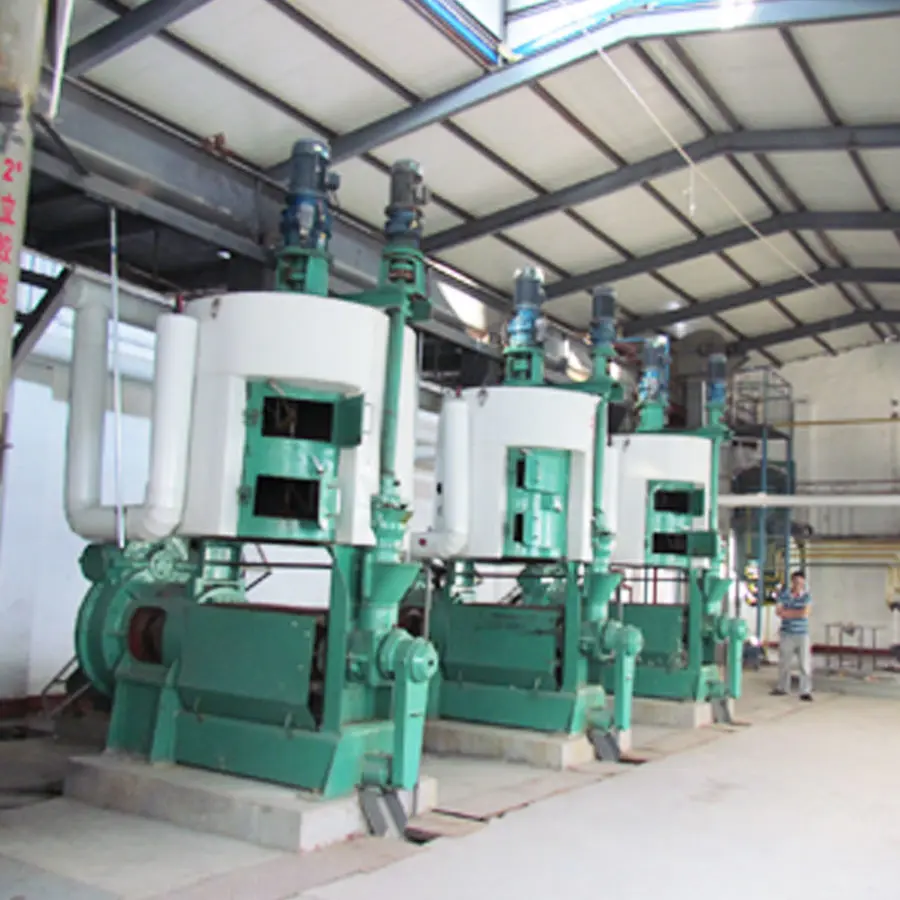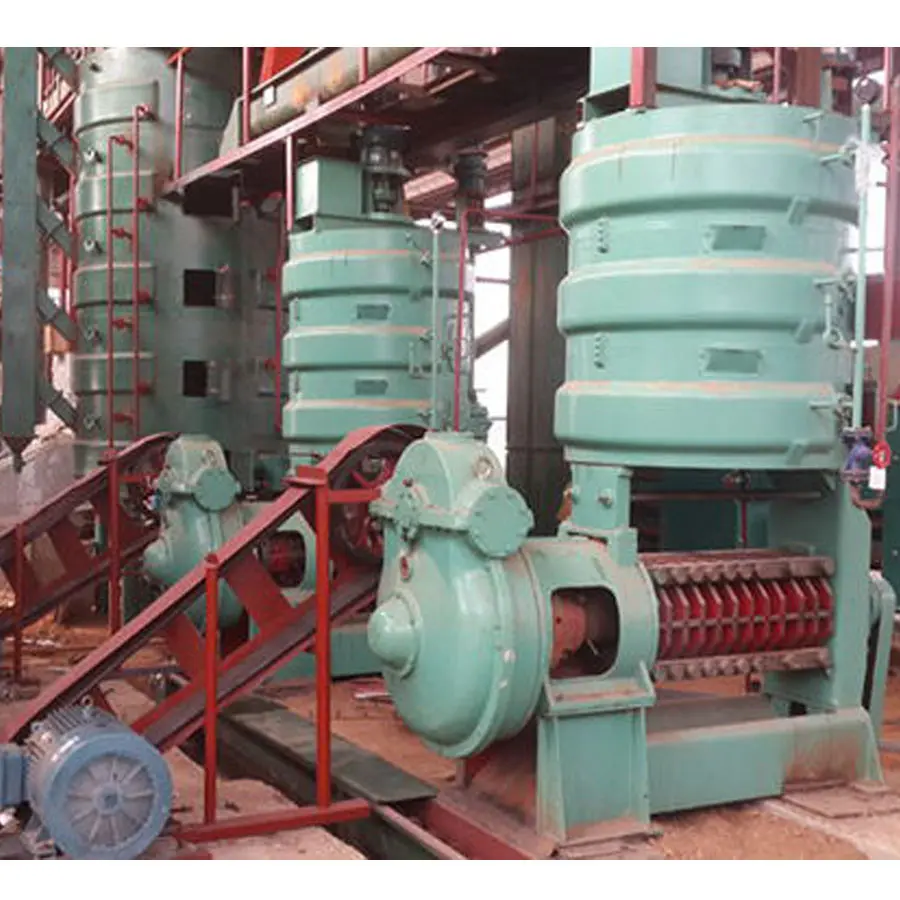Sep . 22, 2025 11:50 Back to list
Industrial Soy Bean Oil Press Machine | High Efficiency & Commercial Grade
Industry Trends & Overview of Modern Oil Press Technology
The global demand for edible oils continues its upward trajectory, driven by population growth and evolving dietary preferences. This surge necessitates advanced processing solutions, particularly within the soy industry, which accounts for a significant portion of worldwide oil production. Consequently, the Industrial Soy Bean Oil Press Machine has become a cornerstone technology for efficient and high-yield oil extraction. Current industry trends highlight a strong focus on automation, energy efficiency, and the integration of smart controls to optimize operational performance and reduce environmental impact. Furthermore, a push towards higher oil recovery rates and enhanced crude oil quality, minimizing subsequent refining steps, is shaping equipment design and material science advancements. Manufacturers are increasingly incorporating robust materials and precision engineering to meet stringent international food safety and operational longevity standards, catering to large-scale industrial demands.
Technological innovations such as variable frequency drives (VFDs) for precise motor control, advanced screw press designs for optimized cake discharge, and intelligent temperature regulation systems are becoming standard. These enhancements collectively contribute to lower specific energy consumption per ton of processed soybeans and higher purity of extracted oil, aligning with sustainable industrial practices. The market is also seeing a rise in demand for modular and scalable systems that can adapt to varying production capacities and facility footprints, offering flexibility to processors globally.
Detailed Process Flow of the Industrial Soy Bean Oil Press Machine
The operation of an Industrial Soy Bean Oil Press Machine involves a meticulously engineered process to maximize oil yield and ensure product quality. This multi-stage process integrates advanced mechanical and thermal treatments, optimized for industrial-scale throughput.
Schematic Steps:
- 1. Pre-treatment (Cleaning & Crushing): Raw soybeans are first cleaned to remove impurities like dust, stones, and metallic particles, often using vibrating screens and magnetic separators. They are then cracked or crushed into smaller pieces (grits) to increase surface area for more efficient oil extraction. This stage utilizes robust stainless steel hoppers and precision crushers.
- 2. Flaking: The crushed soybeans are then passed through roller mills to create thin flakes, typically 0.25-0.35 mm thick. Flaking ruptures the oil cells and further increases the extractable surface area, which is crucial for maximizing oil yield during pressing.
- 3. Cooking/Conditioning: The flakes are heated in multi-deck cookers to specific temperatures (e.g., 95-110°C) and moisture levels (e.g., 8-10%) for a defined period. This process coagulates proteins, denatures enzymes, and reduces oil viscosity, making the oil easier to press. Precise temperature control is vital.
- 4. Pressing/Extraction: The conditioned flakes are fed into the screw press, where a continuous rotating screw applies intense pressure. Oil is expelled through narrow gaps in the barrel cage, while the solid residue (oil cake) is discharged at the end of the press. Modern machines often employ multi-stage pressing for enhanced oil recovery.
- 5. Oil Filtration: The crude oil extracted contains fine solids. It is then passed through a filtration system (e.g., plate and frame filters, leaf filters) to remove these suspended particles, producing a cleaner crude oil ready for further refining or direct sale.
- 6. Cake Processing: The residual oil cake still contains residual oil (typically 5-8%). This cake can be further processed via solvent extraction for maximum oil recovery, or directly used as high-protein animal feed.
Product Materials & Manufacturing Processes:
Our Industrial Soy Bean Oil Press Machines are constructed from premium-grade materials selected for their durability, wear resistance, and hygienic properties. Key components, such as the pressing screws and cage bars, are typically fabricated from high-alloy steel, often hardened through specialized heat treatments to withstand the extreme pressures and abrasive nature of oilseed processing.
- Materials: High-tensile carbon steel for structural frames, wear-resistant alloy steels (e.g., 20CrMnTi, 40Cr) for pressing components, and food-grade stainless steel (e.g., SUS304) for parts in contact with oil or seed for corrosion resistance and hygiene.
- Casting & Forging: Critical stress components often undergo precision casting or hot forging to achieve superior strength and grain structure.
- CNC Machining: Modern CNC (Computer Numerical Control) machining ensures unparalleled precision in component dimensions and surface finishes, vital for consistent operation and extended service life.
- Welding: Robotic and advanced manual welding techniques are employed, followed by stress relief treatments to ensure structural integrity.
Testing Standards & Service Life:
All machines undergo rigorous quality control. We adhere to international standards such as ISO 9001:2015 for quality management and relevant ANSI/ASME mechanical design standards. Key components are tested for material hardness, tensile strength, and fatigue resistance. Our machines are designed for a service life exceeding 15 years with proper maintenance, ensuring long-term return on investment.
Target Industries & Application Advantages:
While primarily serving the edible oil production sector, the underlying mechanical pressing technology finds relevance in other industries requiring efficient solid-liquid separation.
- Target Industries: Edible Oil Production (Soybean, Sunflower, Rapeseed, Palm Kernel), Biofuel Production, Chemical Processing (e.g., separating solids from liquids in certain chemical feedstock preparations).
- Typical Application Scenarios & Advantages:
- Energy Saving: Advanced gear drives and optimized screw geometries reduce energy consumption per ton of processed material by up to 15% compared to older models, leading to significant operational cost savings.
- Corrosion Resistance: Strategic use of stainless steel in crucial contact areas prevents corrosion, prolonging component life and ensuring food safety, particularly important in humid or chemically aggressive environments.
- High Efficiency: Continuous operation with minimal downtime, coupled with high oil extraction rates, ensures maximum productivity.

Technical Specifications & Performance Parameters
Understanding the precise technical specifications of an Industrial Soy Bean Oil Press Machine is critical for evaluating its suitability for specific operational demands. The following table outlines typical parameters for a high-capacity industrial model.
Product Specification Table: Industrial Soy Bean Oil Press Machine (Model SB-2000)
| Parameter | Specification |
|---|---|
| Processing Capacity | 20-25 Tons/24 Hours (Soybeans) |
| Residual Oil Rate in Cake | 5-8% (depends on pre-treatment & seed quality) |
| Main Motor Power | 22-30 kW (Variable Frequency Drive) |
| Heating Power (for barrel) | 6 kW |
| Overall Dimensions (L x W x H) | 3200 x 1200 x 2500 mm |
| Machine Weight | ~4500 kg |
| Screw Material | High-alloy wear-resistant steel (20CrMnTi) |
| Gearbox Type | Heavy-duty helical gear reducer |
| Operational Noise Level | < 85 dB |
| Control System | PLC-based with touchscreen HMI |
| Certifications | CE, ISO 9001:2015 |
These specifications reflect a modern, high-performance machine designed for continuous and reliable operation in demanding industrial environments. The integration of a VFD allows for adaptive processing, optimizing energy use and yield across various soybean qualities.

Application Scenarios and Real-World Experience
The versatility and robust design of the Industrial Soy Bean Oil Press Machine make it indispensable across a spectrum of industrial applications, beyond just edible oil production. Its efficiency and reliability have been proven in various operational contexts globally.
Key Usage Scenarios:
- Large-scale Edible Oil Mills: Central to operations for continuous production of crude soybean oil, destined for refining into cooking oil, margarine, and other food products. Integrated into complete oil processing lines, often preceding solvent extraction units.
- Animal Feed Production Facilities: The high-protein oil cake byproduct is a valuable component in livestock and poultry feed formulations. The machine facilitates efficient separation, delivering consistent quality feed ingredients.
- Biodiesel Plants: Soy oil can be transesterified into biodiesel. These presses provide a cost-effective method for extracting oil feedstock, contributing to sustainable energy production.
- Specialty Oil Production: While primarily for soybeans, adapted versions can process other oilseeds for specialty oils used in cosmetics, industrial lubricants, and pharmaceuticals.
Customer Feedback & Operational Insights:
Our machines have garnered consistent positive feedback from clients across different continents. For instance, a major edible oil producer in Southeast Asia reported a 7% increase in their overall oil recovery rate after integrating our SB-2000 model, attributing it to the optimized screw design and consistent barrel heating.
"The robust construction and user-friendly PLC interface of their Industrial Soy Bean Oil Press Machine significantly reduced our maintenance downtime. We've seen a noticeable improvement in crude oil quality, requiring fewer refining steps downstream."
Another client in South America, focusing on animal feed, emphasized the consistency of the protein content in the oil cake, which is vital for their feed formulations. The machine's ability to handle high throughput while maintaining stable operational parameters is a recurring commendation from our partners.

Technical Advantages and Performance Excellence
Our Industrial Soy Bean Oil Press Machine embodies a commitment to engineering excellence, delivering a suite of technical advantages that translate directly into enhanced operational efficiency and profitability for our clients.
Key Technical Advantages:
- Optimized Screw Press Design: Features a multi-stage pressing screw with varied pitch and depth, precisely machined for progressive compression. This design minimizes back-flow and friction, maximizing oil extraction efficiency and reducing mechanical wear. The tapered shaft design ensures even pressure distribution.
- Advanced Temperature Control System: Integrated heating elements within the press barrel, coupled with precise PID (Proportional-Integral-Derivative) controllers, maintain optimal temperature during pressing. This reduces oil viscosity, facilitates protein coagulation, and significantly enhances oil yield while preserving oil quality.
- Robust Gearbox and Drive System: Utilizes a heavy-duty, enclosed helical gear reducer known for high torque transmission, low noise, and minimal vibration. Paired with a high-efficiency motor and Variable Frequency Drive (VFD), it offers precise speed control, allowing operators to adjust pressing parameters according to seed conditions.
- Durable & Wear-Resistant Components: All parts subjected to high stress and abrasion, such as the pressing screws, cage bars, and wear rings, are manufactured from specialized alloy steels (e.g., 20CrMnTi, 40Cr) and subjected to vacuum carburizing or nitriding treatments. This extends the service life by 30-50% compared to standard materials, reducing maintenance costs.
- Automated Control & Monitoring: Equipped with a Siemens/Schneider PLC-based control system and intuitive HMI (Human Machine Interface) touchscreen. This enables real-time monitoring of temperature, pressure, current, and throughput, facilitating easy operation, fault diagnosis, and data logging for process optimization.
- Energy Efficiency: Through meticulous mechanical design and the integration of VFDs, our machines achieve a specific energy consumption as low as 0.25 kWh per kilogram of oil produced, representing a significant reduction in operational expenditure.
These advantages collectively contribute to a superior pressing performance, lower cost of ownership, and a higher quality end product, underscoring our commitment to leading-edge oil extraction technology.

Vendor Comparison: Choosing the Right Industrial Soy Bean Oil Press Machine
Selecting the optimal Industrial Soy Bean Oil Press Machine involves a thorough evaluation of various vendors against critical performance, reliability, and support criteria. While specific competitor names are not listed, this comparison table highlights key differentiators that buyers should consider when assessing potential suppliers.
Comparative Analysis of Industrial Oil Press Machine Providers
| Feature/Criterion | Our Offering | Competitor A (General) | Competitor B (Budget) |
|---|---|---|---|
| Oil Recovery Rate | Industry Leading (92-95%) | High (88-92%) | Average (85-88%) |
| Component Material Durability | High-alloy, Heat-treated Steel | Alloy Steel | Standard Carbon Steel |
| Energy Consumption (kWh/ton) | Optimized (<25 kWh) | Moderate (25-35 kWh) | Higher (35-50 kWh) |
| Automation & Control | PLC with HMI, VFD Integration | Basic PLC, manual adjustments | Electro-mechanical, basic controls |
| Customization Options | Extensive (Capacity, Features) | Limited | Minimal/None |
| After-Sales Support | Global Network, 24/7 Remote | Regional Support, business hours | Local distributor, limited scope |
| Certifications & Standards | CE, ISO 9001, HACCP Compliant | ISO 9001 | Local standards only |
This comparison highlights that while many manufacturers offer industrial oil presses, differences in engineering, material science, and integrated technology significantly impact long-term performance and total cost of ownership. Our focus on superior materials, advanced automation, and comprehensive support positions us as a leader in delivering high-value solutions for your oil processing needs.

Customized Solutions & Application Case Studies
Understanding that each client's operational requirements are unique, we offer extensive customization options for our Industrial Soy Bean Oil Press Machines. This ensures optimal integration into existing facilities and adherence to specific processing goals, from capacity modifications to specialized material handling systems.
Tailored Customization Options:
- Capacity Scaling: Machines can be configured for varying throughputs, from mid-scale operations (10 TPD) to large industrial plants (100+ TPD), by adjusting press numbers and auxiliary equipment.
- Material Compatibility: While optimized for soybeans, press components can be specified for other oilseeds (e.g., sunflower, rapeseed) by modifying screw profiles and barrel spacing.
- Advanced Automation Integration: Options for higher levels of automation, including integration with centralized plant control systems (SCADA), advanced remote diagnostics, and predictive maintenance sensors.
- Energy Recovery Systems: Implementation of heat recovery exchangers to utilize waste heat from conditioning or pressing, significantly reducing overall energy consumption.
- Enhanced Filtration Units: Customized primary and secondary filtration solutions (e.g., multi-stage filter presses, centrifuges) to achieve specific crude oil purity levels.
Application Case Study: Large-Scale Soybean Processing Facility
Client: AgroPure Foods, a prominent agricultural conglomerate in Brazil.
Challenge: AgroPure Foods needed to expand their soybean crushing capacity from 50 TPD to 150 TPD while simultaneously improving oil recovery and reducing energy costs to meet increasing demand for their refined soybean oil and animal feed products. Their existing presses were inefficient and required frequent maintenance.
Solution: We designed and supplied a complete pressing line featuring four interconnected SB-2000 Industrial Soy Bean Oil Press Machine units, each customized with enhanced motor efficiency and integrated VFDs. The system included automated pre-treatment and flake conditioning units to ensure optimal feed to the presses. We also implemented a centralized PLC control system that allowed for real-time monitoring and adjustment of pressing parameters across all four machines from a single HMI.
Results:
- Increased Capacity: Achieved a stable processing capacity of 160 TPD, exceeding the initial target.
- Oil Recovery: Residual oil in cake consistently reduced from an average of 10% to 6.5%, translating to an additional ~3.5% oil yield.
- Energy Savings: Overall energy consumption per ton of soybeans processed decreased by 20%, leading to substantial operational cost reductions.
- Maintenance & Uptime: Dramatically reduced unscheduled downtime by 40% due to robust machine construction and proactive monitoring via the centralized control system.
This case study exemplifies our capability to deliver tailored, high-performance solutions that directly address complex industrial challenges, providing measurable improvements in efficiency and profitability.

Trustworthiness & Client Support
Our commitment extends beyond delivering high-quality machinery; we prioritize building long-term partnerships through transparent processes, robust support, and unwavering reliability. This section addresses common inquiries and outlines our comprehensive support structure.
Frequently Asked Questions (FAQ):
Q1: What is the typical lead time for an Industrial Soy Bean Oil Press Machine?
A1: Standard models typically have a lead time of 6-8 weeks from order confirmation to shipment. For customized solutions or larger project installations, the lead time can range from 10-16 weeks, depending on the complexity and scope of the project. We provide detailed project timelines during the quotation phase.
Q2: What are the power requirements for your industrial presses?
A2: Our machines are typically configured for 3-phase industrial power (e.g., 380V/50Hz, 440V/60Hz), with main motor power ranging from 22 kW to 75 kW or more, depending on capacity. Specific power requirements will be detailed in the technical specifications for your chosen model and can be adapted to local grid standards.
Q3: How often do the wear parts need replacement?
A3: The lifespan of wear parts (e.g., pressing screws, cage bars) is highly dependent on operational conditions, seed quality, and maintenance practices. Generally, with proper care and non-abrasive seeds, these parts are designed to last 12-24 months of continuous operation. We offer readily available spare parts and provide detailed maintenance schedules.
Lead Time & Fulfillment Details:
Our manufacturing process is optimized for efficiency and quality. Upon receipt of a confirmed order and initial payment, production commences. We maintain a robust supply chain for raw materials and components, ensuring predictable lead times. All equipment undergoes comprehensive factory acceptance testing (FAT) before dispatch to ensure it meets all specified performance metrics and quality standards. Detailed shipping logistics and installation support are coordinated with the client to ensure seamless delivery and commissioning.
Warranty Commitments:
We provide a standard 12-month warranty on all mechanical and electrical components of our Industrial Soy Bean Oil Press Machines, commencing from the date of commissioning or 18 months from shipment, whichever comes first. This warranty covers defects in materials and workmanship under normal operating conditions. Extended warranty options and service contracts are available upon request to provide additional peace of mind and predictable maintenance costs.
Customer Support Information:
Our dedicated customer support team is available to assist you throughout the lifespan of your equipment. We offer:
- 24/7 Technical Assistance: Via phone, email, and remote diagnostics.
- On-site Installation & Training: Our experienced engineers provide comprehensive installation guidance and operational training for your staff.
- Spare Parts & Consumables: A readily available inventory of genuine spare parts ensures minimal downtime.
- Preventative Maintenance Programs: Tailored service plans to optimize machine performance and extend operational life.
Our goal is to ensure your long-term success and satisfaction with our advanced oil pressing solutions.
Conclusion
The modern Industrial Soy Bean Oil Press Machine represents a pinnacle of mechanical engineering, tailored to meet the rigorous demands of industrial-scale oil extraction. By integrating advanced materials, precision manufacturing, and smart automation, these machines deliver exceptional oil recovery rates, energy efficiency, and operational longevity. The continuous evolution of this technology, driven by industry trends towards sustainability and higher product quality, underscores its critical role in global food and feed production. Investing in a high-quality industrial oil press is a strategic decision that promises significant returns through optimized processing, reduced operational costs, and superior product outputs.
Authoritative References:
- United States Department of Agriculture (USDA) Foreign Agricultural Service. Oilseeds: World Markets and Trade. (Referenced for global oil demand and soybean market trends).
- Food and Agriculture Organization of the United Nations (FAO). The State of Food and Agriculture. (Referenced for general agricultural processing trends and sustainability in food production).
- American Oil Chemists' Society (AOCS) Journal. Journal of the American Oil Chemists' Society (JAOCS). (General reference for oilseed processing technologies and analytical methods).
- International Organization for Standardization (ISO). ISO 9001:2015 Quality management systems — Requirements. (Standard for quality management systems in manufacturing).
-
Multi Seed Oil Press – Versatile Solutions for Efficient Seed Oil Extraction
NewsNov.25,2025
-
Spiral Oil Press: Efficient Oil Extraction Technology for Sustainable Production
NewsNov.24,2025
-
Efficient Spiral Oil Expellers for Sustainable Oil Extraction | OilMill China
NewsNov.24,2025
-
Comprehensive Guide to Screw Physical Oil Expeller Technology & Benefits
NewsNov.23,2025
-
Durable and Efficient Screw Physical Oil Presses for Sustainable Oil Extraction
NewsNov.23,2025
-
Screw Oil Expeller – Efficient, Sustainable Mechanical Oil Extraction Solutions
NewsNov.22,2025
